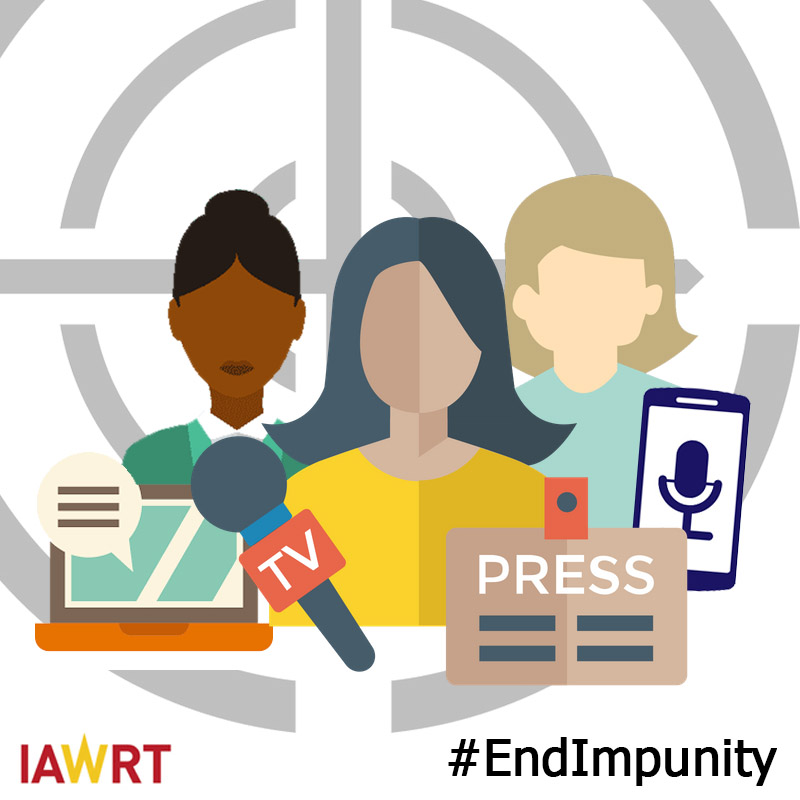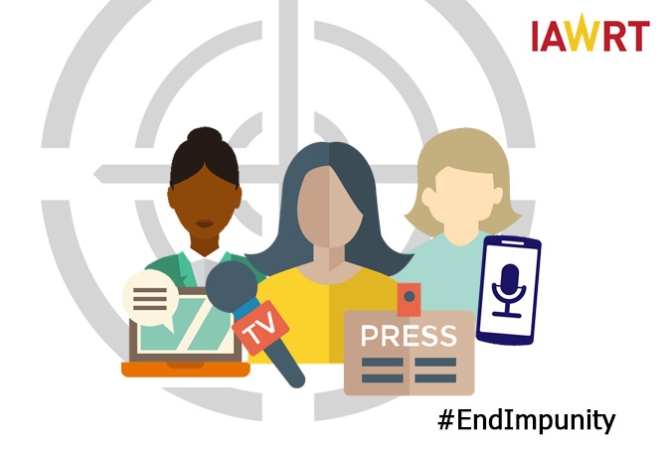End Impunity for Crimes Against Journalists
In this year of the Covid-19 pandemic, journalists had to overcome new or deepening threats to press freedom, freedom of expression, their personal safety and safety at work.
IAWRT statement on International Day to End Impunity for Crimes against Journalists 2020

The International Association of Women in Radio and Television (IAWRT) joins the observance of the International Day to End Impunity for Crimes against Journalists 2020.
The Covid-19 pandemic saw a time when there were attacks on journalists covering the #BlackLivesMatter protests and other political events in the US, clamping down on protests and people’s right to dissent in social media and other platforms in extension of Covid-19 restrictions that various countries imposed, health hazards while covering the pandemic and the resulting job losses and closures in the media industry owing to a period that a large portion of the world was on lockdown.
These were all on top of the longtime problem of journalist attacks and killings, and the emerging problem of gender-based online harassment of journalists.
According to the research and data of the Committee to Protect Journalists, there have been 1,387 journalists killed between 1992 to 2020, among them 97 women journalists. This year, there have been 22 journalists killed, while 248 were imprisoned in 2019 and 64 are missing globally. Most of these cases have yet to bring the perpetrators and masterminds to justice. CPJ noted that killers go free in 8 of 10 cases of journalists murders, which is why it is important that we, along with the public, observe the International Day to End Impunity for Crimes against Journalists.
The United Nations General Assembly adopted Resolution A/RES/68/163 at its 68th session in 2013 which proclaimed 2 November as the ‘International Day to End Impunity for Crimes against Journalists’ (IDEI). The date was chosen in commemoration of the assassination of two French journalists in Mali on 2 November 2013.
While we lament the dire situation of journalists in the world, we also celebrate small wins such as the repeal of criminal libel in Sierra Leone and hope and fight for more reforms to allow journalists to work unhindered. On the one hand, we continue to call for justice and decry the guilty verdict in the cyberlibel case of Maria Ressa in the Philippines, that was based on an antiquated law pre-dating the cyberlibel law and other more recent jurisprudence in the country.
Fellow IAWRT Philippines members have also been slapped with cases of libel during the pandemic, red-tagged as a prelude to further harassment, arrested based on search warrants yielding ‘planted evidence’ and one of them, Frenchie Mae Cumpio, remains in jail since February. Another community journalist, Elena Tijamo, was abducted by suspected state agents while her town was on lockdown and remains missing since June 13. We call on the release of Frenchie and all other journalists wrongly detained or only detained because of their line of work. We call for Elena to be surfaced, along with all other missing or disappeared journalists globally.
Violence against journalists and their media outfits are a threat and a violation of press freedom and freedom of expression and an offence against democracy, while the killing of a journalist is the ultimate form of censorship. On this day, we remember fellow women journalists who were murdered* and continue to call for justice and continue our fight for press freedom.
Gabrielle Marian Hulsen
Karmela Sojanovic
Aysel Malkac
María Carlin Fernández
Ilaria Alpi
Lissy Schmidt
Winifrida Mukamana
Yasmina Drici
Rachida Hammadi
Malika Sabour
Naïma Hammouda
Yasmina Brikh
Saïda Djebaili
Khadija Dahmani
Nadezhda Chaikova
Nina Yefimova
Veronica Guerin
Larisa Yudina
Amparo Leonor Jiménez Pallares
Maria Grazia Cutuli
Natalya Skryl
Zahra Kazemi
Nadia Nasrat
María José Bravo
Kate Peyton
Raeda Wazzan
Marlene Garcia-Esperat
Dolores Guadalupe García Escamilla
Relangi Selvarajah
Hind Ismail
Atwar Bahjat
Maricel Vigo
Ogulsapar Muradova
Karen Fischer
Anna Politkovskaya
Naqshin Hamma Rashid
Luma al-Karkhi
Khamail Khalaf
Zakia Zaki
Sahar Hussein Ali al-Haydari
Sarwa Abdul-Wahab
Uma Singh
Anastasiya Baburova
Natalya Estemirova
Marites Cablitas
Lea Dalmacio
Gina Dela Cruz
Marife “Neneng” Montaño
Maria Elizabeth Macías Castro
Marie Colvin
Regina Martínez Pérez
Ghislaine Dupont
Nawras al-Nuaimi
Wassan Al-Azzawi
Rubylita Garcia
Elsa Cayat
Randa George
Dalia Marko
Flor Alba Núñez Vargas
Hindia Haji Mohamed
Sagal Salad Osman
Miroslava Breach Velducea
Gauri Lankesh
Daphne Caruana Galizia
Leslie Ann Pamela Montenegro del Real
Maharram Durrani
Wendi Winters
Norma Sarabia Garduza
Maria Elena Ferral Hernández
*Committee to Protect Journalists data on murdered women journalists from 1992 to 2020.








